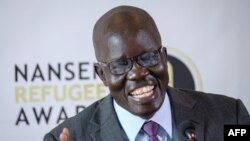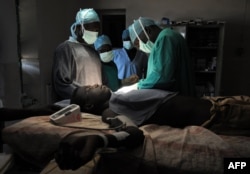Winner of this year's UNHCR Nansen Award, South Sudanese surgeon, Evan Atar Adaha, says he will use the Award's $150,000 cash prize to upgrade his ill-equipped hospital, so he can save more lives. Atar will be honored for two-decades of medical services to victims of war and persecution at an official ceremony Monday.
Evan Atar Adha and a team of doctors, nurses and midwives work in Maban hospital in Bunj, a town of more than 200,000 people in northeastern South Sudan. Atar said his hospital, which lies in the midst of a war zone, lacks even the most basic equipment and supplies. He told VOA the challenges facing him, and his team are enormous.
"The resources of this award are going to really help us do better because we obviously will be able to get some equipment and some machines that we need like anesthetic machine, x-ray."
Atar said the team at Maban hospital carries out an average of 58 surgeries a week with only a single light in the surgical theater. He said electricity is provided by generators that often break down. The hospital itself, he said has room for only 120 beds. This is not enough so, people sleep on the verandah—wherever there is space.
"Our maternity, if you like has 30 beds and we are putting two mothers in one bed…So, with this—if we are able to expand maternity, I will be so happy."
For the past two decades, Atar has provided medical aid for thousands of refugees, internally displaced, wounded fighters and local communities at great personal sacrifice. He sees his wife and four children in Nairobi, Kenya three times a year. Yet, he said he has no plans to retire.
"I will work for another 20 years. I think as long as I am seeing I am needed in the place… I will not go from there until I make sure things are really settled in the end and the only hope for that is actually peace. If peace comes to South Sudan and Sudan."
Nansen winner Atar told VOA he will be happy when he is no longer needed.








